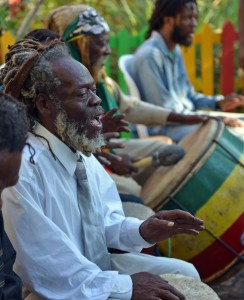Justin Chang began swing dancing in high school in his hometown of Seattle, Wash., where the dance is a popular pastime.
“Swing dance is really big in Seattle,” Chang said. “Frankie Manning, who popularized the Lindy Hop back in the ’30s and ’40s, would actually come and dance with us a lot.”

Along with his love for dance, Chang grew up listening to the masters of jazz and Motown. Duke Ellington, Dizzy Gillespie and Louis Armstrong are just some of the famous jazz musicians that have inspired Chang.
Due to his love for dance and music, Chang has crafted a multimedia presentation for Black History Month on the evolution of black song and dance and its influence in American culture. The first presentation received such positive reviews from the audience that another presentation will be given later this month.
“I grew up listening to these people, and when I got into swing dance I realized a few things,” Chang said. “The Charleston moves came from tap dance, and I also noticed that a lot of hip-hop moves came from the Charleston and the Lindy Hop. I was really intrigued as to why that would be.”
Chang is a senior majoring in international relations and an event coordinator for Multicultural Student Services. Along with Jennifer Langi, cultural programs coordinator at MSS, Chang and other students work to put together multicultural events that many BYU students enjoy, such Fiesta, Luau and Pow Wow.
When the group met to talk about events that could be organized for Black History Month, Chang came up with an idea that would focus on the evolution of black song and dance.
“(Chang) mentioned to me, ‘You know what, for Black History Month we should really have a night where we talk about music and dance just because everything that we love that is American has ties to Africa,'” Langi said. “He was really excited about it, so I thought, why not, let’s give it a shot.”
With the idea and a thesis in mind, Chang started researching the roots and history of black music and dance.
“Modern American music and modern American dance are inseparably connected to our slave legacy,” Chang said. “That is where our music and dance come from.”
After he was done with his research, Chang put together a multimedia presentation packed with information dating back from the 1600s to today. Thanks to the nature of Chang’s research, this presentation is not a typical hour-long lecture.
“I felt that showing where our music and dance come from through the people that were doing that would be more powerful than just having performers,” Chang said. “I was looking at the actual historical investigation; I wanted a lot of period clips. I don’t mind if someone comes and does a tap routine, but I want to be able to show Bill “Bojangles” Robinson and Sammy Davis Jr. doing them.”
Chang’s presentation, “The Evolution of Black Song and Dance,” was shown on Feb. 1.
Desiree Quartey, a senior from Provo majoring in public health and a student assistant at MSS, is a member of the BYU Black Student Union. Quartey went to the first presentation along with other fellow Black Student Union members and loved it.
“It was amazing,” Quartey said. “It was really well put together, and he starts straight from Africa and goes right up to modern music today, so it was really cool to see that connection.”
In parts of his presentation, to the delight of audience members, Chang illustrates different points by showing clips. In one part, he shows a Michael Jackson video and compares it to the choreography in “West Side Story.” West African drum beats are also compared to LMFAO’s hit “Party Rock Anthem.”
Quartey explained that music and dance are a big part of African culture and its influence on American culture.
“We do talk about civil rights a lot, which is why I thought this was cool. It’s different,” Quartey said. “It’s not just talking about slavery and bad stuff that happened.”
Because of positive reviews and demands for more presentations, the Black Student Union has invited Chang to repeat his presentation. The event is free and open to the public and will take place on Feb. 26 at 7 p.m. at the Harold B. Lee Library Auditorium.




